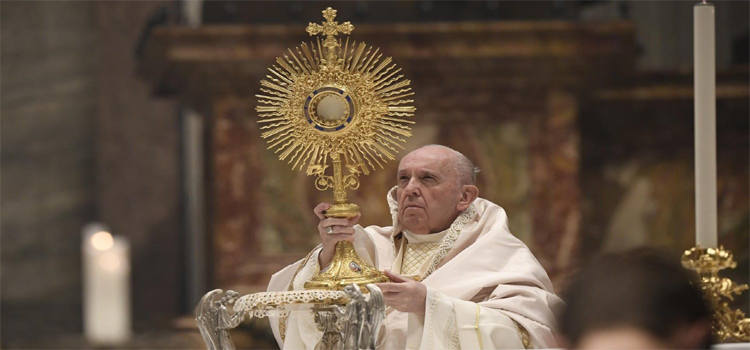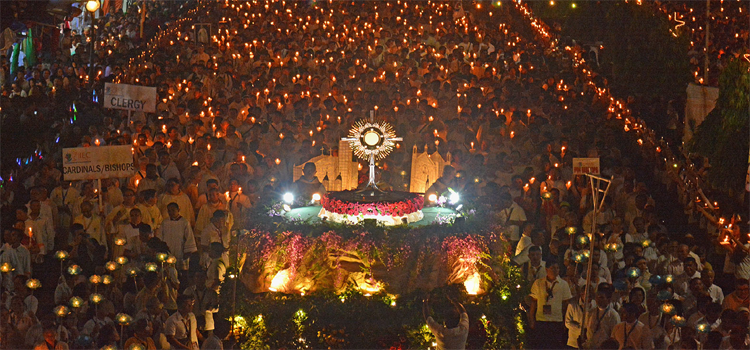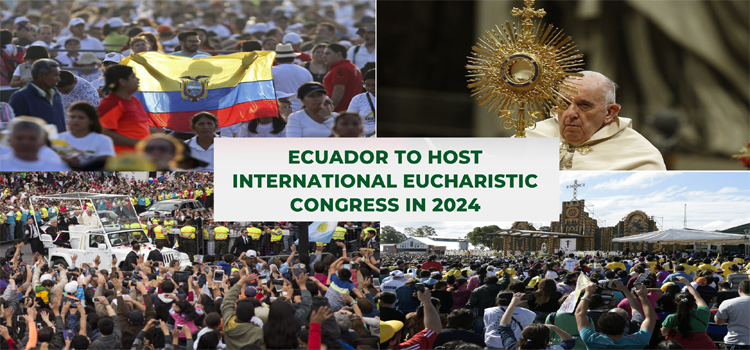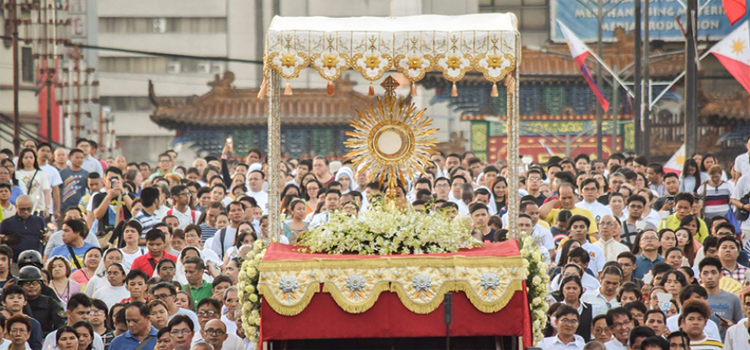INTERNATIONAL EUCHARISTIC CONGRESS

History
The first International Eucharistic Congress was held in Lille, France, in 1881. It was organized by a laywoman, Marie-Marthe-Baptistine Tamisier, in response to the decline of the Catholic Church in France following the French Revolution.A Eucharistic Congress is an international gathering of people which aims to: 1 Promote an awareness of the central place of the Eucharist in the life and mission of the Catholic Church; 2 Help and improve our understanding and celebration of the liturgy; 3Draw attention to the social dimension of the Eucharist.he aim was to unify the respect for the most holy Eucharist and large mass events, making people this way sensitive to the eucharistic "presence", and show Catholics how numerous and strong they are. At the same time, these plans were difficult to implement because of the strains between the Church and the French governments. However, thanks to the Northern France Catholics, where eucharistic associations started to flourish, in the June of 1881 the first eucharistic congress was held at Lille. Besides the French and Belgian believers, delegations arrived from eight other countries. The organizers decided to set up a commission in order to ensure the continuity of the movement, and they planned the framework of future congresses, which included lectures, accounts, worship events and a closing procession.
Jesus instituted the Eucharist on the night before He was arrested in Matthew 26. While He and the disciples ate the Passover meal together, Jesus gave them bread and a cup of wine, telling them they were His body and blood.Eucharist Provides us with the strength and nourishment we need to fulfill all the ordinary tasks of life, so also the Eucharist provides us with true sustenance in the spiritual life – giving us a supernatural power to follow Jesus and bear witness to the Gospel.
When did Jesus Christ institute the Eucharist? Jesus instituted the Eucharist on Holy Thursday “the night on which he was betrayed” (1 Corinthians 11:23), as he celebrated the Last Supper with his apostles.The Mass consists in some sense of two parts, namely the Liturgy of the Word and the Liturgy of the Eucharist, these being so closely interconnected that they form but one single act of worship.Built to inspire the faithful to enter more deeply into the Eucharistic Revival, the Playbook is organized around the four pillars at the core of the Revival: Personal Encounter with Christ, Reinvigorating Devotion, Deepening Formation, and Missionary Sending.Some Christian denominations place the origin of the Eucharist in the Last Supper of Jesus with his disciples, at which he is believed to have taken bread and given it to his disciples, telling them to eat of it, because it was his body, and to have taken a cup and given it to his disciples, telling them to drink of it.

In the Eucharist the Church both receives the gift of Jesus Christ and gives grateful thanks to God for such a blessing. This thanksgiving is the only proper response, for through this gift of himself in the celebration of the Eucharist under the appearances of bread and wine Christ gives us the gift of eternal life.The Acts of the Apostles also shows that the Eucharist (at first called 'the Breaking of Bread') was one of the cornerstones of Christian life and identity from earliest times.Be pleased, o God, we pray, to bless, acknowledge, and approve this offering in every respect; make it spiritual and acceptable, so that it may become for us the Body and Blood of your most beloved son, our Lord Jesus christ. he joins his hands.
54th International Catholic Eucharistic Congress Sydney Australia 2028

Next International Eucharistic Congress to be held in Sydney, Australia in 2028. The 53rd International Eucharistic Congress in Quito, Ecuador, wrapped up on Sunday with the announcement that Sydney will host the next International Eucharistic Congress in 2028.Together we encountered the living Jesus Christ, experienced renewal, and were sent out “for the life of the world.” Throughout these five days, our Church experienced a new Pentecost and was anointed for the Year of Mission to come.The first International Eucharistic Congress owed its inspiration to Bishop Gaston de Ségur, and was held at Lille, France, on June 21, 1881. The initial inspiration behind the idea came from the laywoman Marie-Marthe-Baptistine Tamisier (1834–1910) who spent a decade lobbying clergy.Sydney, capital of New South Wales and one of Australia's largest cities, is best known for its harbourfront Sydney Opera House, with a distinctive sail-like design. Massive Darling Harbour and the smaller Circular Quay port are hubs of waterside life, with the arched Harbour Bridge and esteemed Royal Botanic Garden nearby.
Theme
The theme that Pope Francis chose is: “Fraternity to heal the world.” Enlightened with the biblical text: “You are all brothers” (Mt 23:8).A Eucharistic Congress is an international gathering of people which aims to: 1 Promote an awareness of the central place of the Eucharist in the life and mission of the Catholic Church; 2 Help and improve our understanding and celebration of the liturgy; 3Draw attention to the social dimension of the Eucharist.Eucharistic Congresses are gatherings of ecclesiastics and laymen for the purpose of celebrating and glorifying the Holy Eucharist and of seeking the best means to spread its knowledge and love throughout the world.

An International Eucharistic Congress aims to love, serve and make Our Lord Jesus Christ in his Eucharistic Mystery more known. Since He is the center of the life of the Church and his mission is to heal the wounds of the world.Eucharistic Congresses are gatherings of ecclesiastics and laymen for the purpose of celebrating and glorifying the Holy Eucharist and of seeking the best means to spread its knowledge and love throughout the world.They must be fully initiated Catholics in good standing. That means they have received the Sacraments of Baptism and Confirmation, and participate faithfully in the celebration of the Eucharist. They must be single or married.

Leave a Reply